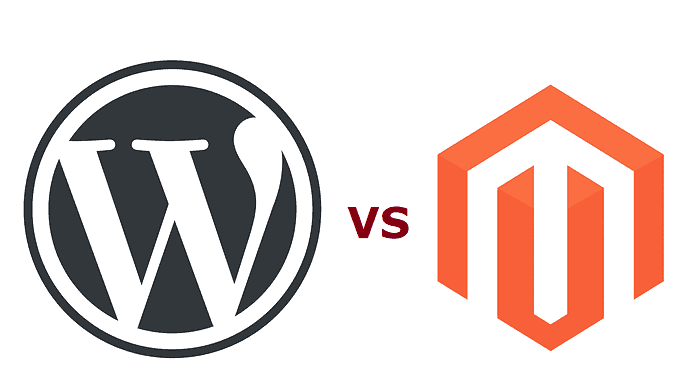If you want to start an online business then the first thing to do is choose the right platform for your website. There are hundreds of different ecommerce platforms out there and each one combines different benefits from its competitors. But which one should you choose? This is the question most entrepreneurs ask when they are in a rush and want to get their website online quickly.
WordPress, the free open-source content management system (CMS), and Magento, a suite of e-commerce software for small and midsize businesses by Italian company eBay. Although both of them are great platforms to build your online store, many experts debate between two ecommerce platforms: WordPress vs Magento to determine which one is the greatest of all.
These two eCommerce platforms have different goals and characteristics, so it’s prudent to understand what both offer and how each can help your business grow. This would help you make an important decision about whether you need to hire WordPress developers or Magento developers in India to start working on your online store.
WordPress
WordPress is a popular CMS that you can use to build an online store. It’s easy to use, cost-effective, and can be set up quickly. WordPress is used to power millions of websites online. It’s an open-source platform that’s built on PHP, and it’s available as a free download at WordPress.com.
WordPress is a great choice if your business is just starting or needs a simple solution to quickly get up and running. It becomes very easy for businesses no matter their scale and size to customize their eCommerce website using WordPress as the platform provides a variety of features. The WordPress ecommerce plugin allows you to add shop pages, product pages, categories, and tags, as well as images and videos.
Pros
- WordPress is free to use and install. There are no hidden fees or costs to get started with this system.
- It’s easy to set up. You can add new or existing products, categories, and tags in minutes with no coding experience needed.
- WordPress offers a huge library of plugins that you can use to enhance your website visually and functionally.
- You can easily add payment gateways such as PayPal or Stripe to accept payments on your site without any technical knowledge required.
- You can customize almost everything about your site, from its look and feel to its layout and functionality. You can even add new pages, add extra content and adjust layout options at any time.
- The free version of WordPress enables you to create personal blogs and websites without paying for anything.
- WordPress has dozens of powerful features that make it easy to create great-looking websites without having any advanced knowledge of coding or design techniques. These include page builder plugins (like Visual Composer), drag-and-drop interfaces, custom fields/tabs, taxonomies/categories, and more all available for free!
Cons
- WordPress is great if you want to build a blog or website with a few pages, but it’s not ideal for complex eCommerce stores that need more flexibility and control over the content.
- It’s not as secure as Magento or Shopify. WordPress is an open-source platform, so there are plenty of third-party plugins that can add features and functionality to your site. However, these add-ons often come with security issues. In addition, many popular themes for WordPress have been found to contain malicious code that can attack visitors’ computers and steal their personal information (phishing).
- It doesn’t support mobile checkout as Magento does. Magento was built with mobile users in mind from the start. With its designed-from-scratch mobile shopping experience, it lets customers shop from their phones without having to log in through their browsers first (or any browser at all).
Magento
Magento is a PHP-based powerful eCommerce platform that’s built for merchants to manage and grow their businesses. It’s also a great choice if you’re looking to expand your business into multiple countries or have an international audience.
Magento is a purpose-built platform. It was built by German software developer Armin Ronacher, who wanted to build something that would work well on all web browsers and mobile devices. The result was a one-stop shop for ecommerce stores, with features like secure payment processing, digital downloads, and much more.
Pros
- Magento’s popularity comes from its flexibility and customizability. If you want to build a unique store, you can do that with Magento. It’s also highly configurable, so you can change the look and feel of your store at any time.
- Magento is very easy to use
- You don’t need to have any coding experience to start building an online store with Magento.
- Magento has an extensive ecosystem of add-ons, extensions, plugins, and themes to help you build the best store for your customers.
- It is easy to use and has a user-friendly interface that makes it simple to set up and run your online shop.
- Magento provides a large array of products and services but the best part is that you can customize all of them according to your business requirements.
- While using Magento, you can provide your customers with multiple payment options including credit card processing, Paypal, and more. It will be easy to accept payments from customers if you provide them with more payment options.
- It is compatible with many other eCommerce platforms such as Shopify, BigCommerce, Square Market, and more than 30 others like WooCommerce, Zen Cart, or PrestaShop.
Cons
- The biggest con of Magento is its in-house support. Since the platform is open source, many companies create extensions and add-ons to the platform. This can make things complicated for new users who don’t know which extension should be used or where to find it.
- Another con of Magento is that it does not have an online forum or knowledge base. This can make it difficult for you to find answers to your questions about the product or how to use it properly.
- It’s too expensive
- It’s not compatible with mobile devices
- The admin panel isn’t very user-friendly
Differences between WordPress and Magento
Magento has a lot of features that allow you to customize your store more than other eCommerce platforms do. However, WordPress is more customizable than Magento when it comes to customization options. This means that if you want to change something in your store, WordPress gives you more control over your store than Magento does.
WordPress has thousands of free and paid plugins available for its users. You won’t find as many free plugins for Magento as there are for WordPress. Also, paid plugins aren’t always compatible with Magento so be sure not to purchase them until you’re sure they’ll work with your website.
WordPress is a more advanced platform than Magento, but it’s also much more complex to use. Magento has a much simpler installation process, but you will still need to learn some basic knowledge about HTML and PHP if you want your store to look good.
Magento comes with built-in tools for managing your website like creating pages, uploading files, and setting up navigation menus. WordPress does not include such tools out of the box, so it may take longer for new users to get started with their online store.
Summary
So in this article, we go through the basic introductions of both the eCommerce platforms that are at the top in their technological arena. We also discussed the strengths and limitations of Magento and WordPress along with the key differences between both platforms.
Now, what would you do after obtaining knowledge about these platforms? Well, compare each to the list of your business requirements and identify which one of these eCommerce platforms is more suitable to fulfil your needs. And there you have it. Thanks for reading. I hope it helps!








